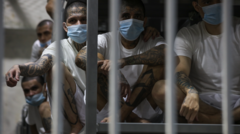El Salvador's President Nayib Bukele recently extended a proposal to Venezuelan leader Nicolás Maduro, suggesting a repatriation deal centered on the exchange of 252 deported Venezuelans for the release of an equal count of political detainees. In his communication via social media, Bukele highlighted that while many of the deportees are alleged criminals implicated in serious offenses such as "rape and murder," the political prisoners in Venezuela are often imprisoned solely for opposing Maduro's government, which has faced accusations of undemocratic practices and human rights violations.
The proposition comes on the heels of recent deportations, with over 200 Venezuelans sent to El Salvador from the US. These deportees have been linked to the Tren de Aragua gang, prompting concerns about the ongoing challenges in immigration policies and legal disputes surrounding the deportation process. The US President's administration has faced difficulties in enforcing these hard-line immigration policies, with the Supreme Court stepping in to halt the deportation of alleged gang members under the controversial Alien Enemies Act.
While Bukele's proposal aims to address both the plight of Venezuelan deportees and the fate of political prisoners in Venezuela, the response from Maduro’s government remains unclear, with the regime denying the existence of political prisoners, a claim contradicted by various human rights groups monitoring the situation. In addition to the Venezuelan detainees, Bukele also referenced nearly 50 foreign nationals, including individuals from the US, caught in the ongoing conflict of interests surrounding immigration and criminal justice between the nations.
The proposition comes on the heels of recent deportations, with over 200 Venezuelans sent to El Salvador from the US. These deportees have been linked to the Tren de Aragua gang, prompting concerns about the ongoing challenges in immigration policies and legal disputes surrounding the deportation process. The US President's administration has faced difficulties in enforcing these hard-line immigration policies, with the Supreme Court stepping in to halt the deportation of alleged gang members under the controversial Alien Enemies Act.
While Bukele's proposal aims to address both the plight of Venezuelan deportees and the fate of political prisoners in Venezuela, the response from Maduro’s government remains unclear, with the regime denying the existence of political prisoners, a claim contradicted by various human rights groups monitoring the situation. In addition to the Venezuelan detainees, Bukele also referenced nearly 50 foreign nationals, including individuals from the US, caught in the ongoing conflict of interests surrounding immigration and criminal justice between the nations.





















